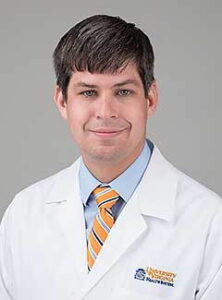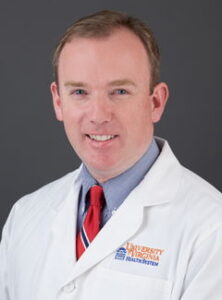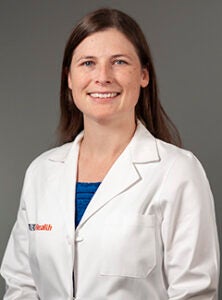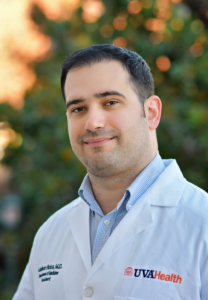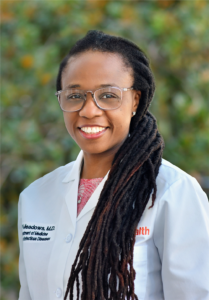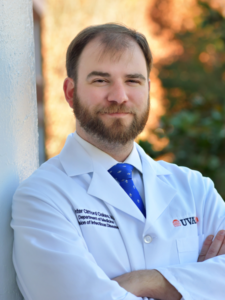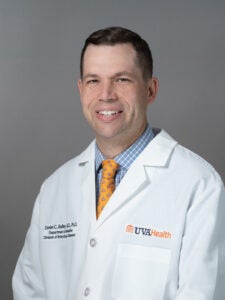ID Clinical Fellowships (MD)
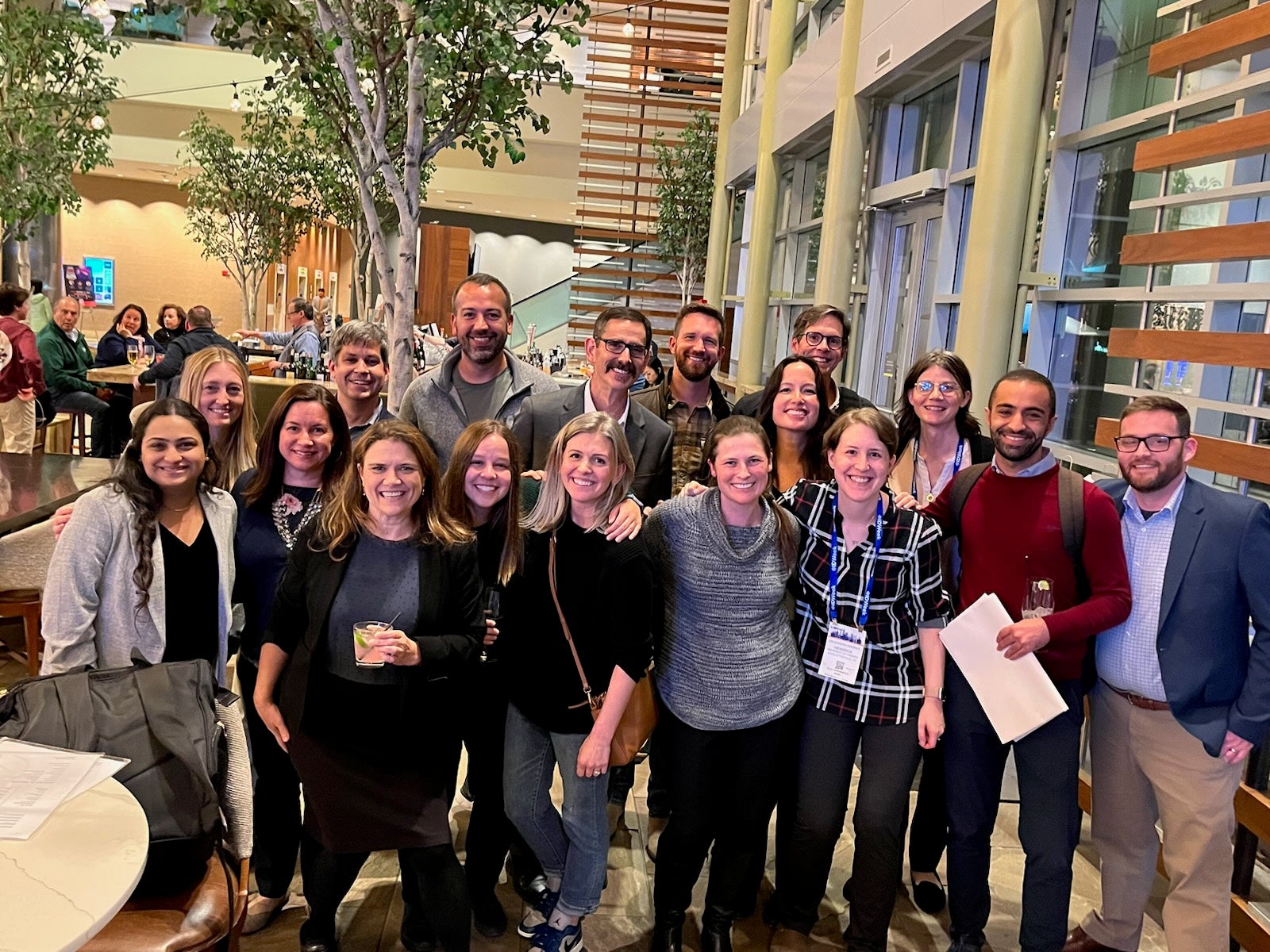 UVA’s Infectious Diseases fellowship training program aims to produce world-class physicians prepared for a career of impact in academic infectious diseases. Our ACGME-accredited program provides rigorous training and supervised experience under the guidance of faculty members with extensive expertise in clinical medicine, research, and education. Opportunities abound for rich interdisciplinary experiences with cutting-edge basic science and translational, clinical, and epidemiologic infectious diseases researchers, antimicrobial stewards, hospital epidemiologists, and medical educators.
UVA’s Infectious Diseases fellowship training program aims to produce world-class physicians prepared for a career of impact in academic infectious diseases. Our ACGME-accredited program provides rigorous training and supervised experience under the guidance of faculty members with extensive expertise in clinical medicine, research, and education. Opportunities abound for rich interdisciplinary experiences with cutting-edge basic science and translational, clinical, and epidemiologic infectious diseases researchers, antimicrobial stewards, hospital epidemiologists, and medical educators.
We offer two training tracks, both designed to prepare fellows for a successful career in academic medicine. Regardless of track, all fellows work closely together and share clinical experiences.
The physician-scientist training track is a three-year program designed to prepare fellows for success as both skilled clinicians and independent investigators. The entire first year of the track is devoted to research, with no inpatient or outpatient clinical responsibilities. This enables the rapid development of research skills and independent research programs, leading to more productive research during the clinical years of training. Each fellow develops a research program under the guidance of one or more faculty members from the Division of Infectious Diseases or another relevant department (e.g., Microbiology, Public Health Sciences). Fellows are mentored throughout all phases of research, including project definition, experimental design, and data interpretation.
The clinician-educator training track is a two-year program designed to prepare fellows for careers as academic clinicians and educators in undergraduate and graduate medical education. Fellows work with one or more faculty members involved in medical education to gain experience and develop a capstone project demonstrating excellence in teaching. Fellows on this track also have the opportunity to deepen their clinical training in areas of particular interest, including antimicrobial stewardship, hospital epidemiology, and infections in immunocompromised individuals (ID).
In both tracks, clinical training is distributed over two years (physician-scientist track, years 2-3; clinician-educator track, years 1-2) and includes both immunocompromised-heavy inpatient experience and longitudinal outpatient clinics. Each fellow’s experience is highly customized to personal interests and career goals.
The inpatient clinical training experience includes opportunities to observe and manage adult patients with a wide variety of infectious diseases through the ID consult service. Fellows are expected to develop expertise in the prevention, evaluation, and management of infections, particularly in the core areas defined by national standards for infectious diseases specialist training.
While on the inpatient consult services, fellows lead the service, direct rounds, and supervise resident and medical student learners. Fellows independently complete new inpatient consults and staff them with attendings, either on rounds the following morning if patient cases are of low acuity or less complex, or that evening if cases are higher acuity or more complex. Fellows evaluate patients on the service in the morning before rounds, conducting a thorough assessment and developing a treatment plan based on supporting data from recent literature. They present each of their patients to attendings at 10:00 a.m. rounds, with a discussion of relevant data and teaching by the attending. Rounds also include an ID clinical pharmacist who assists the team in antibiotic dosing and management of medication interactions and side effects. The ID inpatient consult service provides fellows with the autonomy to develop evaluative and management skills necessary for adequately caring for a complex patient population, while also offering adequate supervision and support from faculty. Patients seen on this service are followed during both the acute and recovery phases of their illnesses. When necessary, outpatient follow-up is provided by the fellow in one of the outpatient ID clinics.
Fellows rotate on two teaching services. The General Infectious Diseases consult service consists of one attending physician and two fellows. These services care for most inpatients, including those with HIV. The Immunocompromised Infectious Diseases consult service is staffed by one attending physician and one fellow. This service caters to patients with solid organ and stem cell transplants, as well as those with hematologic malignancies. Two non-teaching inpatient consult services operate in parallel to offload the teaching teams on busy days, but fellows get first pick of cases.
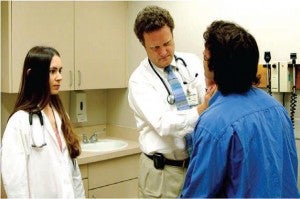 Outpatient clinical training at UVA provides opportunities for trainees to observe and manage adult patients with a wide variety of infectious diseases in ambulatory clinics staffed by faculty members. These rotations result in a well-rounded experience, ensuring trainees’ competence for longitudinal care of patients with a broad range of clinical infectious diseases.
Outpatient clinical training at UVA provides opportunities for trainees to observe and manage adult patients with a wide variety of infectious diseases in ambulatory clinics staffed by faculty members. These rotations result in a well-rounded experience, ensuring trainees’ competence for longitudinal care of patients with a broad range of clinical infectious diseases.
During the clinical years (physician-scientist track, years 2-3; clinician-educator track, years 1-2), fellows attend clinic one half-day per week. Clinic days alternate between the Ryan White HIV clinic and the General Infectious Diseases clinic.
As part of the UVA Ryan White Clinic, trainees care for people living with HIV from Charlottesville and surrounding areas. The clinic serves approximately 800 patients. Under the direction of dedicated faculty, trainees assume primary responsibility for a panel of 50-60 patients, including issues related to antiretroviral therapy, prophylaxis, and the management of opportunistic infections, as well as the social and financial aspects of case management. Trainees are expected to participate in all aspects of longitudinal care, including phone consultations and directing referrals to other specialists as needed for their patients. Trainees may also assist the Inpatient Infectious Disease Service as required when one of their patients is admitted to the hospital. Generally, patients are seen for regular visits every 3 to 6 months, depending on their clinical status.
The UVA General Infectious Disease Clinic receives patients from a variety of referral sources, including other medical and surgical teams within UVA, as well as surrounding community hospitals and outpatient-based practices that lack dedicated infectious disease physicians. Fellows are encouraged to follow up with their hospital appointments from the inpatient consult service. A wide range of patients is seen in the clinic, reflecting the diverse population of the Charlottesville area and its surrounding communities, as well as a large population of travelers from the University of Virginia and the significant immigrant population in the area. Infections seen in this clinic include but are not limited to tuberculosis and other mycobacterial infections (including leprosy), brucellosis, ehrlichiosis, nocardiosis, invasive fungal infections such as histoplasmosis and aspergillosis, CMV infections, epidural and brain abscesses, and endocarditis, along with a host of more common infections including osteomyelitis, indwelling line and vascular graft infections, Lyme disease, and many others.
In addition to these clinics, fellows have the opportunity to expand their experience by participating in additional clinics of special interest:
- Transplant Clinic
- Travelers Clinic
- Hepatitis C Clinic
- Tuberculosis and Non-Tuberculosis Mycobacterial Diseases Clinic
- Musculoskeletal Infectious Diseases Clinic
- Complicated difficile Clinic

Above (l-r): Infectious Diseases post-doctoral fellow Katherine Ralston; UVA graduate student Nona Jiang; ID clinical fellow Poonam Korpe, MD. They participated in a study conducted by Bill Petri’s lab of mother-infant cryptosporidiosis in Bangladesh.
The physician-scientist track offers a rich, interdisciplinary experience in ID research, preparing fellows for careers as independent investigators on medical school faculties. Preceptors are carefully chosen to maximize opportunities for interactions between clinicians and basic scientists.
The entire first year of the track is devoted to research, with no inpatient or outpatient clinical responsibilities. This enables the rapid development of research skills and independent research programs, leading to more productive research during the clinical years of training. Years 2 and 3 are divided between clinical and protected research time.
 Each fellow develops a research program under the guidance of one or more faculty members from the Division of Infectious Diseases or another relevant department (e.g., Microbiology, Public Health Sciences). Fellows are mentored throughout all phases of research, including project definition, experimental design, and data interpretation. Toward the end of the fellowship, as trainees prepare to establish careers as independent investigators, most fellows write grant applications for programs such as the K08/K23 Mentored Clinical Scientist Development award. With this rigorous training, fellows are given the best chance to succeed as academic infectious disease physicians.
Each fellow develops a research program under the guidance of one or more faculty members from the Division of Infectious Diseases or another relevant department (e.g., Microbiology, Public Health Sciences). Fellows are mentored throughout all phases of research, including project definition, experimental design, and data interpretation. Toward the end of the fellowship, as trainees prepare to establish careers as independent investigators, most fellows write grant applications for programs such as the K08/K23 Mentored Clinical Scientist Development award. With this rigorous training, fellows are given the best chance to succeed as academic infectious disease physicians.
A strong spirit of collegiality within the Division of Infectious Diseases fosters an ideal environment for training students, fellows, and junior faculty members. Our faculty strives to minimize the barriers that prevent fellows from seeking and receiving the help they require for their research projects, and co-mentoring of students and fellows is a common practice. Most of the division’s research laboratories, along with its administrative offices, are housed in the Carter-Harrison Research Building (MR6), which has 50,000 sq. feet of space dedicated to immunology and infectious diseases. Labs in other locations are connected to MR6 by weatherproof walkways.
The clinician-educator training track provides additional experience in medical education, preparing fellows for careers as clinicians and educators on medical school faculties. Fellows work with experienced and successful educators to build a competitive portfolio of teaching accomplishments, including a capstone project.
This track includes didactic training in medical education provided by the UVA Department of Medicine and teaching experience overseen by ID faculty educators. ID faculty are heavily involved in undergraduate and graduate medical education, including in the medical school pre-clinical years, the MS3 internal medicine core rotation, the MS4 ID elective, and the internal medicine residency program. Fellows work with a faculty mentor to design and deploy a new educational intervention that serves as a capstone project demonstrating teaching excellence.
Clinician-educator track fellows also have the opportunity to expand their clinical training in areas of interest. The curriculum is tailored to each fellow’s career goals. It can include more intensive stewardship training, working closely with the hospital epidemiology group, gaining additional inpatient or outpatient experience with immunocompromised ID, joining one of our specialized outpatient clinics, and other opportunities.
The clinical microbiology lab staff comprises approximately 30 full-time technicians and three faculty members: Director Melinda Poulter, PhD, and Associate Directors Emily Snavely, PhD, and Amy Mathers, MD (ID physician and co-director of antimicrobial stewardship). Professional technologists in each of the lab areas (virology, molecular diagnostics, mycology, mycobacteriology, and bacteriology) provide trainees with a detailed review of colony and Gram stain morphologies, molecular testing, and drug susceptibility testing for infectious pathogens. Time is allotted for further study in areas of interest to trainees. Current areas of research and development in the lab include the assessment of molecular techniques for detecting pathogens directly from clinical specimens. The lab encourages and facilitates fellows’ infectious disease research projects and has had several publications from such collaborations. While on the inpatient service, fellows are encouraged to attend clinical microbiology rounds every weekday at 1:30 p.m., which focus on lab work-ups of difficult pathogens and reviews of microbiologic and clinical data to facilitate patient care.
Fellows have direct access to the clinical microbiology labs, including diagnostic bacteriology, molecular diagnostics, immunology, and mycology.
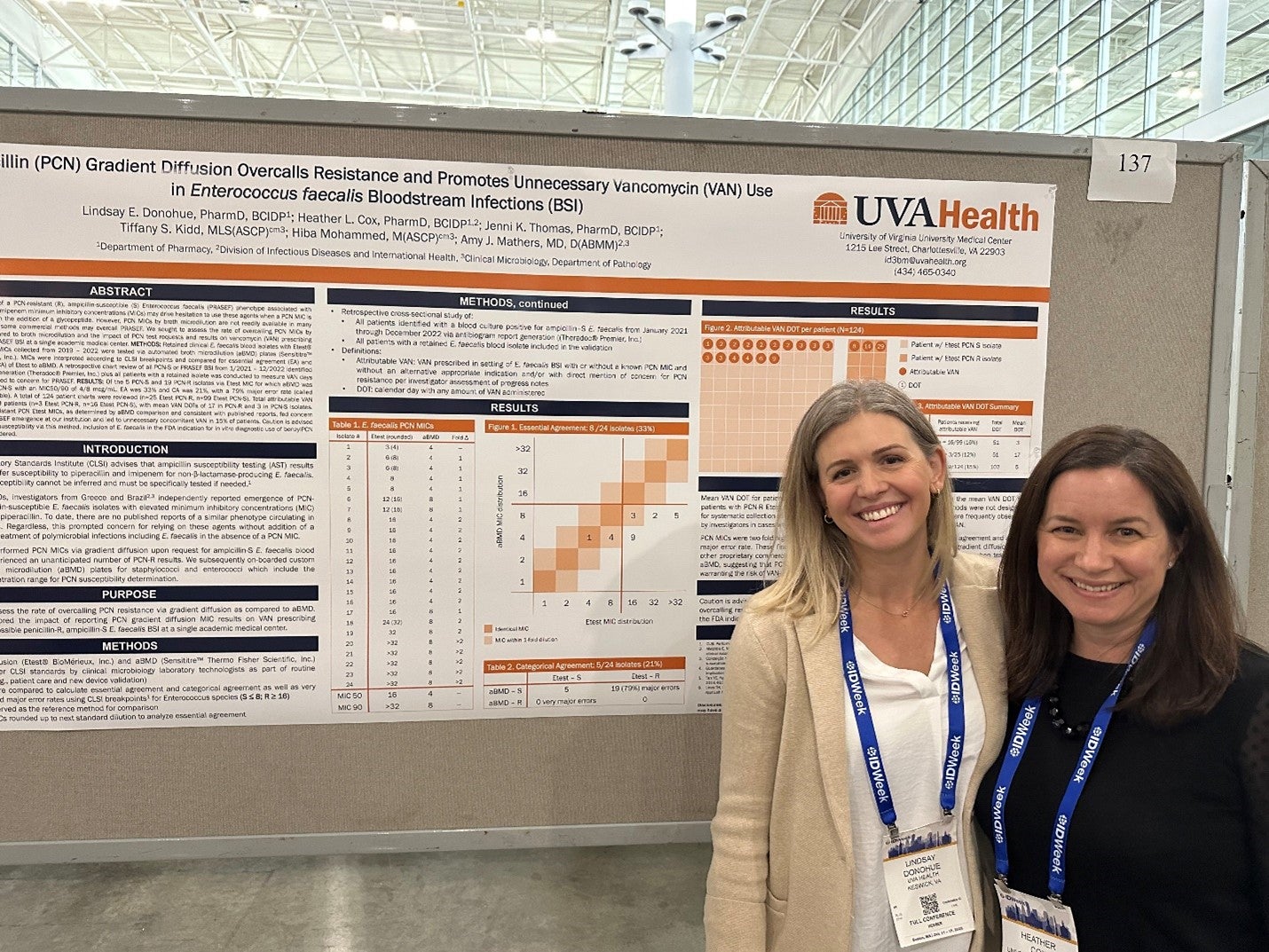 UVA’s antimicrobial stewardship team is a highly active and academically productive group highly integrated with the clinical microbiology lab, pharmacy, and clinical services. The group includes both ID physicians (including the director, Stacy Park, MD, co-director, Amy Mathers, MD, and Patrick Jackson, MD) and ID-trained pharmacists. Fellows participate in the work of the stewardship team during clinical rotations, including coordinating action on molecular diagnostic results and approving restricted antimicrobials. Fellows with a particular interest in stewardship are invited to participate in additional clinical and research experiences with the team. Recent fellow projects have included optimizing responses to Gram-negative resistance testing and improving workflows for perioperative prophylaxis.
UVA’s antimicrobial stewardship team is a highly active and academically productive group highly integrated with the clinical microbiology lab, pharmacy, and clinical services. The group includes both ID physicians (including the director, Stacy Park, MD, co-director, Amy Mathers, MD, and Patrick Jackson, MD) and ID-trained pharmacists. Fellows participate in the work of the stewardship team during clinical rotations, including coordinating action on molecular diagnostic results and approving restricted antimicrobials. Fellows with a particular interest in stewardship are invited to participate in additional clinical and research experiences with the team. Recent fellow projects have included optimizing responses to Gram-negative resistance testing and improving workflows for perioperative prophylaxis.
Costi Sifri, MD, is the director of hospital epidemiology and coordinates a multi-disciplinary group of physicians and infection preventionists to respond to existing and novel threats in the healthcare environment. The hospital epidemiology group collaborates closely with clinical microbiology, environmental services, nursing, physicians, and other departments. Fellows receive training in hospital epidemiology and outbreak investigation. Those with a particular interest can deepen their experience by working directly with the team in a clinical or research capacity.
-
Patrick Jackson, MD
Program Director
-
Caleb Martin, MS
Program Coordinator
-
Chris Moore, MD
Associate Program Director
-
Stacy Park, MD
Associate Program Director
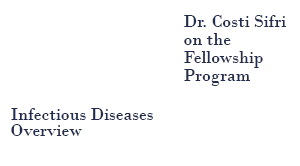
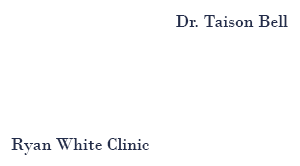
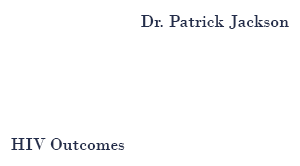

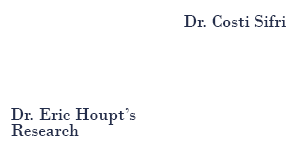


THIRD-YEAR FELLOWS
-
Addison Hicks, MD
Residency: University of Virginia
Email: ASH6ZU@uvahealth.org
3rd Year
-
Idu Meadows, MD
Residency: Baptist Health
Email: PQD8UA@uvahealth.org
3rd Year
-
Peter Oakes, MD
Residency: Louisiana State University
Email: PJF9EV@uvahealth.org
3rd Year
SECOND-YEAR FELLOWS
-
Benjamin Fuller, MD
Residency: University of Vermont
qth5jr@uvahealth.org
-
Daniel Bailey, MD
Residency: University of Vermont
nht4uw@uvahealth.org
FIRST-YEAR FELLOWS
Photos coming soon!
UVA Infectious Diseases Clinical Fellowship Alumni
Our trainees have gone on to achieve success in the field of infectious diseases in both academic and clinical settings throughout the U.S., as well as in programs with a global impact.
Anne M. Anglim, MD, MS
Hospitalist, St. Peter’s Hospital (Helena, MT)
Luis F. Barroso, MD
Assistant Professor of Infectious Diseases, Department of Internal Medicine
Wake Forest University (Winston-Salem, NC)
Oluma Y. Bushen, MD
Currently: Infectious diseases physician in private practice
Avera Medical Group (Sioux Falls, SD)
Formerly: Associate Research Scientist, School of Public Health, Columbia University,
International Center for AIDS Care and Treatment – Clinical Advisor in Jimma, Ethiopia
Karin E. Byers, MD, MS
Assistant Professor of Medicine & Clinical Director of Infectious Disease
University of Pittsburgh Medical Center (Pittsburgh, PA)
David P. Calfee, MD, MS
-Associate Professor of Medicine & Associate Professor of Healthcare Policy & Research
Department of Medicine, Weill Cornell Medical College
-Chief Hospital Epidemiologist, New York-Presbyterian/Weill Cornell Medical Center (New York, NY)
Anita Cheruvanky, MD
Tedra M. Claytor, MD
Assistant Professor, Brody School of Medicine, East Carolina State University
Vincent A. Covelli, DO
Private practice, St. Mary High Desert Medical Group
Shandra Day, MD
Assistant Clinical Professor of Medicine, College of Medicine
Ohio State University (Columbus, OH)
Rebecca Dillingham, MD
Director, UVA Center for Global Health
Associate Professor of Medicine, Division of Infectious Diseases & International Health
Department of Medicine, UVA (Charlottesville, VA)
Najah Doka, MD, MPH
Infectious disease physician in private practice
Infectious Diseases Care (Randolph, NJ)
Andrew Ebers, MD
Private practice, Mercy Clinic Infectious Disease – Physician Plaza
Joshua Eby, MD
Assistant Professor of Medicine, Division of Infectious Diseases & International Health
Department of Medicine, UVA (Charlottesville, VA)
Molly Fleece, MD
Academic Faculty, University of Alabama at Birmingham
Megan Gray, MD
University of Michigan
Elizabeth Gulleen, MD
Acting Instructor, Department of Medicine,
Division of Allergy & Infectious Diseases, University of Washington (Seattle, WA)
Keri K. Hall, MD, MS
Infectious Diseases physician in private practice
Sentara Martha Jefferson Medical & Surgical Associates (Charlottesville, VA)
Scott K. Heysell, MD, MPH
Assistant Professor of Medicine, Division of Infectious Diseases & International Health
Department of Medicine, UVA (Charlottesville, VA)
Eric R. Houpt, MD
Professor of Medicine, Division of Infectious Diseases & International Health
Vice Chair for Research, Department of Medicine, UVA (Charlottesville, VA)
Molly Hughes, MD, PhD
Associate Professor of Medicine, Division of Infectious Diseases & International Health
Department of Medicine, UVA (Charlottesville, VA)
Christopher D. Huston, MD
Associate Professor of Medicine, Division of Infectious Diseases
University of Vermont College of Medicine (Burlington, VT)
Michael G. Ison, MD, MS
Associate Professor of Medicine-Infectious Diseases (joint appointment as Associate Professor of Surgery-Organ Transplantation), Division of Infectious Diseases
Northwestern University Feinberg School of Medicine (Chicago, IL)
Shevin Jacob, MD, MPH
Acting Assistant Professor, Division of Allergy & Infectious Diseases
Associate Director, INTERSECT (International Respiratory and Severe Illness Center)
University of Washington (Seattle, WA)
Tobi B. Karchmer, MD, MS
Infectious diseases physician in private practice (Sparks Glencoe, MD)
Poonam Korpe, MD(2014)
Assistant Scientist, Division of Infectious Disease Epidemiology
Johns Hopkins Bloomberg School of Public Health (Baltimore, MD)
Jessica D. Lewis, MD (2015)
Assistant Professor of Medicine
UVA Division of Infectious Diseases & International Health (Charlottesville, VA)
Rajat Madan, MD, PhD (2014)
Assistant Professor of Clinical Medicine, Department of Internal Medicine
University of Cincinnati College of Medicine (Cincinnati, OH)
Amy J. Mathers, MD
Assistant Professor of Medicine, Division of Infectious Diseases & International Health
Department of Medicine, University of Virginia (Charlottesville, VA)
Kathleen McManus, MD
Assistant Professor of Medicine, Division of Infectious Diseases & International Health
Department of Medicine, University of Virginia (Charlottesville, VA)
Shannon N. Moonah, MD
Assistant Professor, Medicine- Infectious Diseases and International Health
Department of Medicine, University of Virginia (Charlottesville, VA)
Christopher C. Moore, MD
Associate Professor of Medicine, Division of Infectious Diseases & International Health, Department of Medicine; Associate Director for Clinical Fellowship Program, Division of Infectious Diseases & International Health, University of Virginia (Charlottesville, VA)
Christopher M. Moore, MD
Assistant Professor of Medicine, Division of General, Geriatric, Palliative Care & Hospital Medicine
Department of Medicine, University of Virginia (Charlottesville, VA)
Jonathan P. Moorman, MD, PhD
Professor of Medicine & Chief, Division of Infectious Diseases
Vice Chair of Research & Scholarship, Department of Internal Medicine, Quillen College of Medicine
East Tennessee State University (Johnson City, TN)
Carlene A. Muto, MD, MS
Associate Professor of Epidemiology & Medicine, Division of Infectious Diseases
Department of Medicine, University of Pittsburgh School of Medicine
Medical Director, Infection Control & Hospital Epidemiology, UPMC Health System (Pittsburgh, PA) Chair, Antibiotic Resistance Task Force, Society for Health-Care Epidemiology of America
Christopher H. Parsons, MD
Associate Professor of Medicine and Microbiology, Department of Internal Medicine/Section of Infectious Diseases, Louisiana State University School of Medicine; Director, HIV Malignancy Program, Translational Tumor Virology Group, Louisiana Cancer Research Center (New Orleans, LA)
Sean Pawlowski, MD
Infectious disease physician in private practice
Colorado Infectious Diseases Associates, LLP (Denver, CO)
Kristine M. Peterson, MD
Associate Professor, Division of Infectious Diseases, University of Wisconsin
James Platts-Mills, MD (2015)
Assistant Professor of Medicine
UVA Division of Infectious Diseases & International Health (Charlottesville, VA)
John H. Powers III, MD, FACP, FIDSA
Senior Medical Research Scientist and Infectious Diseases Clinical and Teaching Attending,
Division of Clinical Research
National Institute of Allergy and Infectious Diseases, National Institutes of Health (Bethesda, MD)
Tricia L. Royer, DO
Assistant Professor of Medicine
Division of Infectious Diseases
Sidney Kimmel Medical College at Thomas Jefferson University (Philadelphia, PA)
Cassandra D. Salgado, MD, MS
-Associate Professor of Medicine, Division of Infectious Diseases, Department of Internal Medicine, Medical University of South Carolina;
-Program Director, Infectious Diseases Fellowship, MUSC
-Medical Director for Infection Control & Hospital Epidemiologist, MUSC (Charleston, SC)
Katherine R. Schafer, MD
Assistant Professor of Infectious Diseases
Wake Forest School of Medicine (Winston-Salem, NC)
Amanda Schnee, MD
Clinical Assistant Professor, University of South Carolina School of Medicine (Greenville, SC)
Jae Shin, MD
Assistant Professor of Medicine, Division of Infectious Diseases & International Health
Department of Medicine, University of Virginia (Charlottesville, VA)
Upinder Singh, MD
Associate Professor of Medicine & Chief, Division of Infectious Diseases & Geographic Medicine,
Department of Medicine, Stanford University School of Medicine (Stanford, CA)
Cynthia Snider, MD
Infectious diseases physician in private practice
Cone Health Regional Center for Infectious Diseases (Greensboro, NC)
Theodore S. Steiner, MD
Professor and Associate Head, Division of Infectious Diseases, Department of Medicine,
University of British Columbia (Vancouver, BC, Canada)
Jeffrey Tessier, MD
Clinical Chief, UT Southwestern Medical Center
Nathan M. Thielman, MD
Professor of Medicine, Research Professor of Global Health, Division of Infectious Diseases,
Department of Medicine, Duke University School of Medicine (Durham, NC)
Tania Thomas, MD, MPH
Assistant Professor of Medicine, Division of Infectious Diseases & International Health
Department of Medicine, University of Virginia (Charlottesville, VA)
Applications will be received only through the Electronic Residency Application Service (ERAS). Virtual interviews will be conducted late August through October. As required by the Infectious Diseases Society of America, all fellowship positions are filled through the NRMP Match.
Only completed applications will be considered, and they must include all of the following documentation:
- ERAS Application
- Medical School Dean’s letter
- Medical School transcript
- Residency Program Director’s letter of recommendation
- Two additional letters of recommendation
- USMLE transcript – Steps 1, 2, and 3 are required.
- ECFMG certification, if appropriate
Personal Statement
Highly qualified international physicians are encouraged to apply. UVA institutionally sponsors J1 visas.
Further Information: Please get in touch with the Infectious Diseases Fellowship Program Coordinator, Caleb Martin, at (434) 243-6832
UVA Health is the only major tertiary care center in a catchment area of approximately 4,000 square miles offering comprehensive infectious diseases specialty services. Thus, we see a variety of interesting and challenging infectious disease cases.
The Charlottesville-Albemarle (Welcome to Charlottesville video) region has a population of approximately 100,000, and UVA Health receives referrals from several nearby cities, including Lynchburg, Roanoke, Staunton, and Waynesboro. Trainees see patients with infections common to urban settings, as well as conditions arising from the environment, such as endemic mycoses, soil-borne infections like non-tuberculous mycobacteria, and tick-borne infections like ehrlichiosis, Lyme disease, and Rocky Mountain Spotted Fever, as well as animal-borne infections like Q fever, cryptococcosis, and rabies. A large local population of immigrants and migrant workers, as well as the many international travelers affiliated with UVA, produce a variety of travel-related presentations, including common ones such as malaria, tuberculosis, typhoid fever, and hepatitis A, and less-common ones such as ascariasis, fascioliasis, tick typhus, and lepromatous leprosy. Close affiliation between the UVA Ryan White HIV Clinic and the ID Inpatient Consultation Service gives trainees experience with an array of HIV-related illnesses.
Find out more about life in Charlottesville here.

